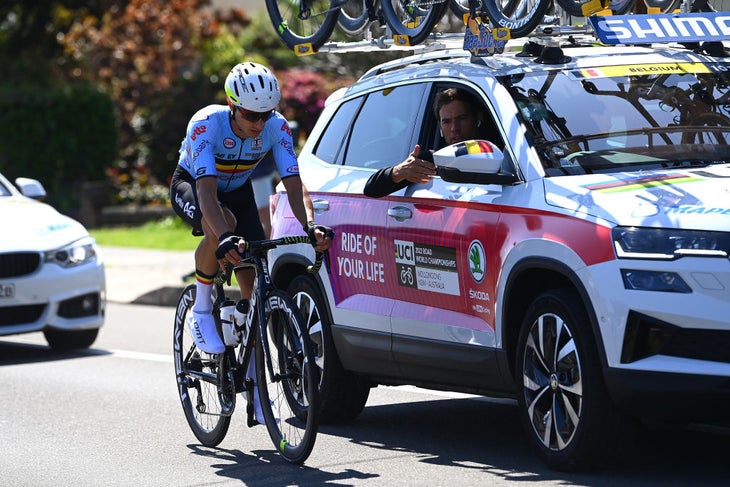“Racing without radios is outdated.”
That’s what Wout van Aert said after missing the medals at the UCI Road World Championships Sunday.
Van Aert and rainbow jersey rival Tadej Pogačar bewailed the ban of race radio in worlds competition after being caught out unawares that silverware was still up for grabs in the final of Sunday’s road race.
“Without radio it’s a drama,” Van Aert told Sporza. “Apparently I crossed the finish line in fourth, but I couldn’t tell if I was sprinting for 10th, 15th, or second. It’s a pity, because I had the legs to climb onto the podium with Remco.”
Also read: Van Aert relishes ‘perfect’ day for Belgium as Evenepoel dominates road worlds
Racing at the road world championships is one of the rare occasions when riders rely on moto chalkboards and face-to-face chatter with team cars to understand time splits and on-road dynamics.
It’s a hard mute from the in-ear comms with clued-up directors that riders receive in regular racing and an extra layer of chaos on top of the confusion caused when riders swap trade team jerseys for national colors.
The “radio silence” was loud in the ears of disappointed world champion contenders Sunday.
Scattered groups of chasers were out of intel that a silver and bronze medal were still up for grabs after Remco Evenepoel gobbled up gold with his rampaging ride into the rainbow jersey.
“We didn’t know which place we were racing for. I thought maybe we were racing for the top-10. We were trying to catch that group with Wout van Aert, but nobody knew we were in the fight for the medals,” Slovenian superstar Pogačar said.
“We didn’t even know where [national teammate] Jan Tratnik was, and all of a sudden we saw him 100 meters before the finish line. In the end, we were left empty-handed.”
Radio or no?

Like the use of powermeters or the inclusion of gravel in road racing, the “race radio debate” always lurks close beneath the surface of pro cycling.
Traditionalists push for a total ban on in-ear communications. Others advocate for the advancement and question why they’re banned in worlds and Olympic racing.
Rewind 14 months and Annemiek van Vleuten saw what she thought was Olympic gold devalue to silver after she was made aware Anna Kiesenhofer had claimed long-range solo victory in front of her.
Also read: Van Vleuten undone by communication malfunction at Olympic road race
“In the most important race, you’re not allowed to ride with communication, which we usually do. It should make the race more interesting but it made the race more confusing,” Van Vleuten said in Tokyo.
🤦♂️ Annemiek van Vleuten
🏆 Anna Kiesenhofer
📍 Olympic Games (Road Race)
🗓 25 July 2021 pic.twitter.com/oD3oNh6mZ8— Riders celebrating for second place (@Riders2Place) July 6, 2022
Did the lack of race radio make the difference Sunday?
Evenepoel bent the race to his will far before any lack of communication became an issue.
His peloton-splintering attack at 75km to go split the rainbow contenders from the chasers in a selection of power and positioning. And when the Belgian blew Lutsenko off his wheel 50km later, the Kazakh’s forlorn look said it all. When Evenepoel wants to go, he goes.
But could radios have impacted race for second and third place? Maybe so.
“I just saw my [Jumbo-Visma] teammate Laporte, he told me he was second. Racing without radios is outdated, but that’s a different discussion,” Van Aert said. “It is a pity, because I had the legs to be on the podium with Remco.”
Pogačar, Van Aert, and many more may be ruing the radio silence Monday.
It will take a lot more than an earpiece to keep Evenepoel quiet this summer however.
